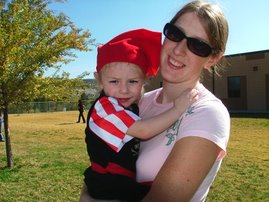

Your genes make up who you are. From your IQ to your freckles, your genes help decide who you will be as an adult. Each of our traits like big feet is inherited from our parents. Each one of our parents passes on to us a dominant or recessive gene for each trait. In order to get a curtain trait we either have to have two recessive genes (one from each parent) or a dominant gene for the trait. If two parents have brown eyes but also carry the recessive gene for blue there is still a 25 % chance that their child can have blue eyes. Genetic inheritance is important to evolution of life because it keep the population ever changing. Also if a person carried a curtain disease that caused them to die young then they wouldn’t have a chance to pass on that disease. Over the years our body's have evolved. One generation after another has passed on traits to help us adapt to our enviroment better and so on. Till we have become the human beings we all are today. Threw this process we have been able to survive longer, hunt better and be healthier.
The key terms for heredity are:
Genotype
“Genotype refers to the genes of the individual.” (Mader Pg422) Genotype is for a particular trait or traits.
Phenotype
Phenotype means traits an individual has like long toes or small teeth.
Allele
Alleles are the set of instructions in a person’s chromosomes that told it what traits to have when the person was developing. You get one allele for each trait from each parent.
Cross
Are the mothers gene type “crossed” with the father’s. For example if both parents are heteroygous meaning they carry both recessive and dominant geneotype, then a cross would be what their children’s chances are for inheriting that trait. It is usually illustrated by a chart like the bug chart; with one parent on one side and the other on another side.
Dominant
A dominant gene trait means that if that person had kids this trait would be most likely because it is dominant.
Recessive
Recessive gene traits are less likely to pass that trait on, unless their spouse also carries the recessive trait.
Genotype
“Genotype refers to the genes of the individual.” (Mader Pg422) Genotype is for a particular trait or traits.
Phenotype
Phenotype means traits an individual has like long toes or small teeth.
Allele
Alleles are the set of instructions in a person’s chromosomes that told it what traits to have when the person was developing. You get one allele for each trait from each parent.
Cross
Are the mothers gene type “crossed” with the father’s. For example if both parents are heteroygous meaning they carry both recessive and dominant geneotype, then a cross would be what their children’s chances are for inheriting that trait. It is usually illustrated by a chart like the bug chart; with one parent on one side and the other on another side.
Dominant
A dominant gene trait means that if that person had kids this trait would be most likely because it is dominant.
Recessive
Recessive gene traits are less likely to pass that trait on, unless their spouse also carries the recessive trait.
In the online labs you had to match the second dragon to the first one. You had to change which traits the dragon had by changing the gene they inherited. It was tricky though because I thought you weren't allowed to change the first dragon only the second. So I would end up with the same dragon just with legs. But you had to change the leg gene on the first dragon so that the second one could inherit no legs. On the fly lab you had two parents and you had to fill in what their chances are of having what type of child. The parents were both heterozygous meaning they carried a domanant and a recessive gene. So they had a 1-4 chance of having a child with the two recessive genes.
Overall it is very important who you came from and what genes you have inherited. They can look at your genes and tell what your chances of inheriting cancer are if you have a history of illness in your family. Some psychologists believe that you can inherit an addictive gene meaing that you would be more likely to become an addict if your parents were or an alcoholic. They also have done research to prove that people grow up with close to the same IQ's as their biological parents, even if they weren't raised by them. Genes are an important part of society and the world. Every animal passes on their traits to their offspring. With out genes we might all just be identical beings. Genes are critical to evolving.
Work Cited: Madder, Sylvia S. “Human Biology” 10th ed. New York: McGraw-Hill, 2007.

No comments:
Post a Comment